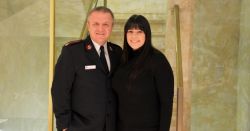Things like this donít happen to people like meÖ

Leonie Thomas with The Salvation Army’s Major Bruce Harmer. (Photo supplied by The Salvation Army Communications Department)
At the age of 38, Leonie Thomas’ life was looking up. After going through a separation, she had moved cities, secured a good job and lost a significant amount of weight – she was looking good and feeling great! She had no idea that her world was about to come crashing down around her.
“One morning I went to get on the treadmill at the gym and I physically couldn’t put one leg in front of the other … I knew that something wasn’t quite right,” she remembers. Within weeks Leonie’s energy levels plummeted, and she was diagnosed with Lupus – an auto-immune disease that attacks various parts of the sufferer’s body.
“Eventually I had to stop work, and if you don’t have any income coming in, just to be able to pay expenses and so forth in life is quite difficult.”
Still reeling from her diagnosis, Leonie now had another crisis to deal with: unable to pay her rent she was evicted from her rental unit and became homeless.
“I’ve been a business owner in the past, I’ve had management positions and upper-management positions, so to not be working – it’s just very humiliating … Not everyone is homeless because of their own choosing.”
Unable to receive priority assistance for government housing because she had not yet been approved for the disability pension (which would have caused more urgency) Leonie became transient, sleeping in her car and emergency accommodation shelters. She describes this low point as one of the most humiliating, degrading and horrific experiences of her life.
“It was really quite frightening, living in close proximity with people from different walks of life,” she says as she describes a homeless shelter in inner-Sydney where she stayed for a short time. “Your room – you could put your hands out and that was the size of your room. It was kind of like what a jail cell would be like.”
Throughout it all, Leonie developed a close relationship with workers at The Salvation Army’s St George Community Welfare Centre who helped her with bill payments, rent and food assistance before she was evicted. They supported her through her homelessness as well.
“The women there were just amazing,” she says. “Because I had stuff in storage… when the seasons changed I didn’t have that change of clothes so The Salvation Army supported me by giving me clothing and so forth to get me through that transitional period.”
Leonie finally secured a place at The Salvation Army’s Samaritan House – an accommodation service for homeless women. “We had our own rooms – they were beautiful rooms – and a communal lounge room and kitchen,” she says.
After three months staying at Samaritan House the government finally granted Leonie the disability pension and she was able to get priority housing. After two years of homelessness, she was able to move into her own home.
“Finally I have a home and, providing I pay my rent each week which they automatically take out so I don’t have to worry about it, I will never, ever in my life be homeless,” she says, beaming.
Despite her illness, Leonie is not the type of person to rest on her laurels: “I don’t like to go through life as a victim, I prefer to try and go through it as a survivor”. Within a year she had established DISC INC– Disadvantaged Individual Support Centre Incorporated – a not-for-profit association that offers support programs to motivate and encourage people from disadvantaged backgrounds. In 2012 her social enterprise won a NSW Tenant Led Initiative Award from the Australasian Housing Institute.
Leonie says she’s been inspired by The Salvation Army’s non-judgemental support to people in need and has modelled her not-for-profit association to act in the same way. “They were like a lifeline to me,” she says of her Salvation Army case-workers Sonia Canover and Maggie Ingham. “For me to have to go in there for assistance was humiliating … but they’ve always made me feel equal.
This week is National Homeless Persons Week. For further information on homelessness, head to: homelessnessaustralia.org.au
Comments
No comments yet - be the first.